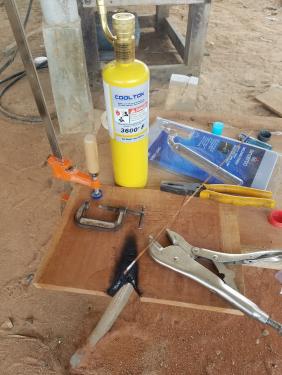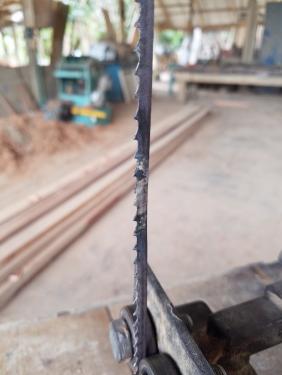01-28-2022, 02:35 PM
My BIL here in Colombia has a pretty large bandsaw in his wood shop. They go through a lot of blades and to help out I offered to start soldering blades for him. They have to run to a town 2 hours away to have blades repaired so this will help him a lot. I've never tried soldering like this before, but after researching, reading and watching some videos it didn't look too difficult. We picked up the needed materials on our last trip to the big town (Monteria). We bought new blade stock, silver solder (don't know the composition), flux and a torch head with two bottles of MAPP gas.
I was planning on building a fancy jig to hold everything in position nicely but my brother was in a hurry and said "C'mon let's test this stuff!" although he said it in Spanish. I made up the jury rigged arrangement below and took a run at it. As you can see we are outside in a windy, dusty environment so results were a little inconsistent. The first attempt didn't work because we were working on an old, rusty, 1/4 inch blade and it was hard to get it down to clean metal. I used a broken C clamp to hold the blade on the left hand side and a pair of vise grips to hold the blade on the right hand side. The skarf bevel was done by hand and eye on the side of the bench grinder stone. The blade was aligned by eye.

The second attempt was better and a tip of the hat to TomG for tips from his YouTube video. This joint lasted for two days of hard use on wood varying from 2 to 6 inches thick. Pretty good for a 1/4" blade!

I didn't have a sander, grinder or file to dress down finished braze so I very gently ground down the surplus with the bench grinder. It looks terrible but it worked. I did another blade yesterday which was a new 3/8 inch blade. I used the same jig and it was a struggle to get a good joint. I think the issue is working outside in the wind and dust. I finally got a decent bond and it was running when I left! We'll see how long it lasts. I gathered up some pieces of angle iron to make up a proper jig and I'll try doing the soldering here in my clean dust and wind free shop.
One of the interesting asides is that this band saw has been in use for several years. They have never brazed/soldered any of their own blades. As soon as I started with my attempts everyone had advice on how to do it. I should be using a different flux. Use brass/bronze instead of silver solder. The blade joint should be vertical instead of horizontal so the solder would run differently. The joint should be a lap joint instead of a skarf joint. It's a cultural thing here and I find it cute. It used to be annoying but I'm retired now and pretty much have all the time I need and can ignore all the static and keep doing what I have seen in every illustration, video and article on blade soldering until I get it right. I'll add a picture of the Mark II jig when its finished.
It's a cultural thing here and I find it cute. It used to be annoying but I'm retired now and pretty much have all the time I need and can ignore all the static and keep doing what I have seen in every illustration, video and article on blade soldering until I get it right. I'll add a picture of the Mark II jig when its finished.
JScott
I was planning on building a fancy jig to hold everything in position nicely but my brother was in a hurry and said "C'mon let's test this stuff!" although he said it in Spanish. I made up the jury rigged arrangement below and took a run at it. As you can see we are outside in a windy, dusty environment so results were a little inconsistent. The first attempt didn't work because we were working on an old, rusty, 1/4 inch blade and it was hard to get it down to clean metal. I used a broken C clamp to hold the blade on the left hand side and a pair of vise grips to hold the blade on the right hand side. The skarf bevel was done by hand and eye on the side of the bench grinder stone. The blade was aligned by eye.
The second attempt was better and a tip of the hat to TomG for tips from his YouTube video. This joint lasted for two days of hard use on wood varying from 2 to 6 inches thick. Pretty good for a 1/4" blade!
I didn't have a sander, grinder or file to dress down finished braze so I very gently ground down the surplus with the bench grinder. It looks terrible but it worked. I did another blade yesterday which was a new 3/8 inch blade. I used the same jig and it was a struggle to get a good joint. I think the issue is working outside in the wind and dust. I finally got a decent bond and it was running when I left! We'll see how long it lasts. I gathered up some pieces of angle iron to make up a proper jig and I'll try doing the soldering here in my clean dust and wind free shop.
One of the interesting asides is that this band saw has been in use for several years. They have never brazed/soldered any of their own blades. As soon as I started with my attempts everyone had advice on how to do it. I should be using a different flux. Use brass/bronze instead of silver solder. The blade joint should be vertical instead of horizontal so the solder would run differently. The joint should be a lap joint instead of a skarf joint.
 It's a cultural thing here and I find it cute. It used to be annoying but I'm retired now and pretty much have all the time I need and can ignore all the static and keep doing what I have seen in every illustration, video and article on blade soldering until I get it right. I'll add a picture of the Mark II jig when its finished.
It's a cultural thing here and I find it cute. It used to be annoying but I'm retired now and pretty much have all the time I need and can ignore all the static and keep doing what I have seen in every illustration, video and article on blade soldering until I get it right. I'll add a picture of the Mark II jig when its finished.JScott
JScott, proud to be a member of MetalworkingFun Forum since Mar 2014.





